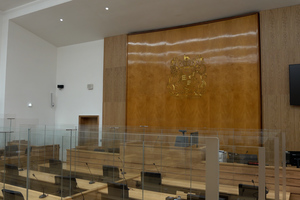Nightingale Courts to remain open to boost capacity and speed up justice
Nightingale Courts across England and Wales are being kept open for another year to reduce waiting times and deliver swift justice for victims.

- 24 temporary Nightingale courtrooms will continue hearing cases in 2023
- Latest investment to help reduce delays for victims
- Crown Court backlog dropping by hundreds of cases each month
A total of 24 temporary courtrooms, which were set up to boost capacity during the pandemic, will remain open in 2023 to allow more cases to be heard.
The government is investing £477 million over next three years to tackle the Crown Court backlog which significantly increased because of the pandemic. This includes allowing courts to run at full capacity, doubling the sentencing powers of Magistrates, and recruiting even more judges.
The number of cases in the backlog fell by almost 800 cases in the last 2 months of 2022, after barristers ended strike action.
Deputy Prime Minister, Lord Chancellor and Secretary of State for Justice, Dominic Raab, said:
We are determined to provide the swift justice that victims deserve, and Nightingale courts have a vital role to play as our justice system continues to recover from the unprecedented impact of the pandemic and last year’s strike action.
The Crown Court backlog is now falling once again, and the continued use of these courtrooms will help to drive it down even further.
Nightingale courts were introduced in 2020 when buildings such as sports arenas, hotels, and conference centres were rapidly transformed into courtrooms to provide more space for jury trials in line with social distancing restrictions. Following their success, the use of temporary courtrooms has continued to provide additional capacity.
Today’s (17 February 2023) announcement marks the third year of the use of Nightingale courts and comes alongside a raft of measures implemented by the Ministry of Justice to tackle the backlog court cases.
Last year, the government lifted the cap on the number of days courts can sit to help them run at maximum capacity, and doubled Magistrates’ sentencing powers so they can hear more cases, freeing up an estimated 1,700 extra days of Crown Court time each year.
Recruiting even more new judges and raising the statutory retirement age is also helping meet increased demand, estimated to retain hundreds of judges and as many as 2,000 magistrates every year.
As a result, the outstanding caseload in the Crown Court fell from a peak of around 60,900 cases during the pandemic in June 2021, to 58,200 at the end of March 2022, prior to strikes by the Criminal Bar Association when outstanding caseload rose to 62,000 in October 2022.
Outstanding cases in the Magistrates’ Court have fallen by nearly a quarter since July 2020.
Notes to editors
- Cloth Hall court in Leeds will no longer operate as a Nightingale court from April 2023 when HMCTS no longer has use of the building. Cases after this time will be heard in nearby courts in Leeds and Bradford.
- Nightingale courtrooms will remain open at the following 11 sites:
- Former court, Chichester (two Crown court rooms)
- Former county court, Telford (three civil and family court rooms)
- Maple House, Birmingham (two crown Court rooms and two civil family and/or tribunal court rooms)
- Former Magistrates court, Fleetwood (two civil and family court rooms)
- Civic Centre, Swansea (one Crown court room)
- Former Magistrates’ court, Cirencester (one Crown court room, one Magistrates rooms)
- Barbican, London (two Crown court rooms)
- Leonardo Hotel Croydon (two Crown court rooms)
- Grand Connaught Rooms, London (two Crown court rooms)
- Maidstone - Mercure (two Crown court rooms)
- Wolverhampton Park Hall Hotel (two Crown court rooms)